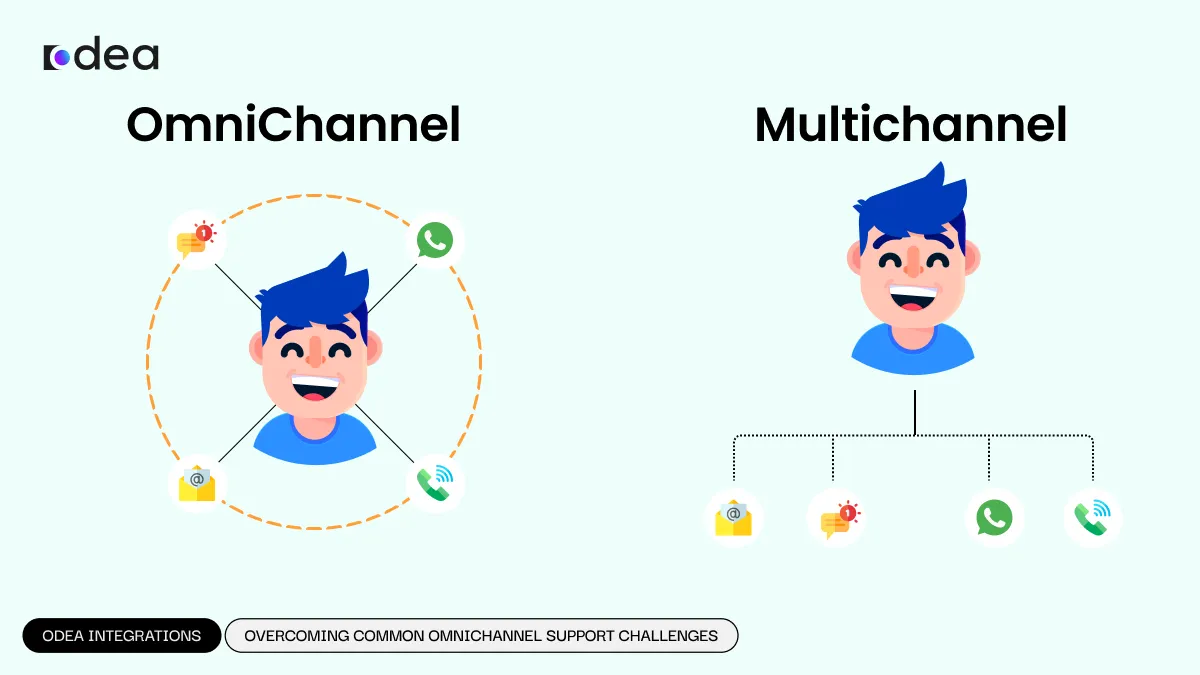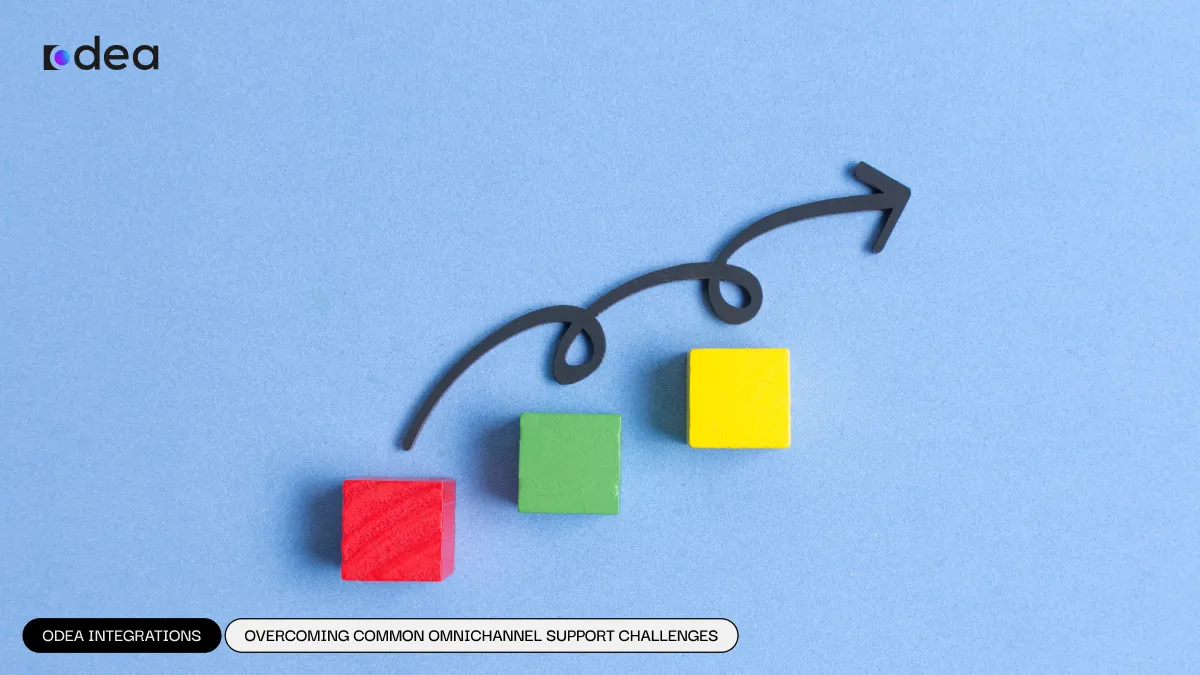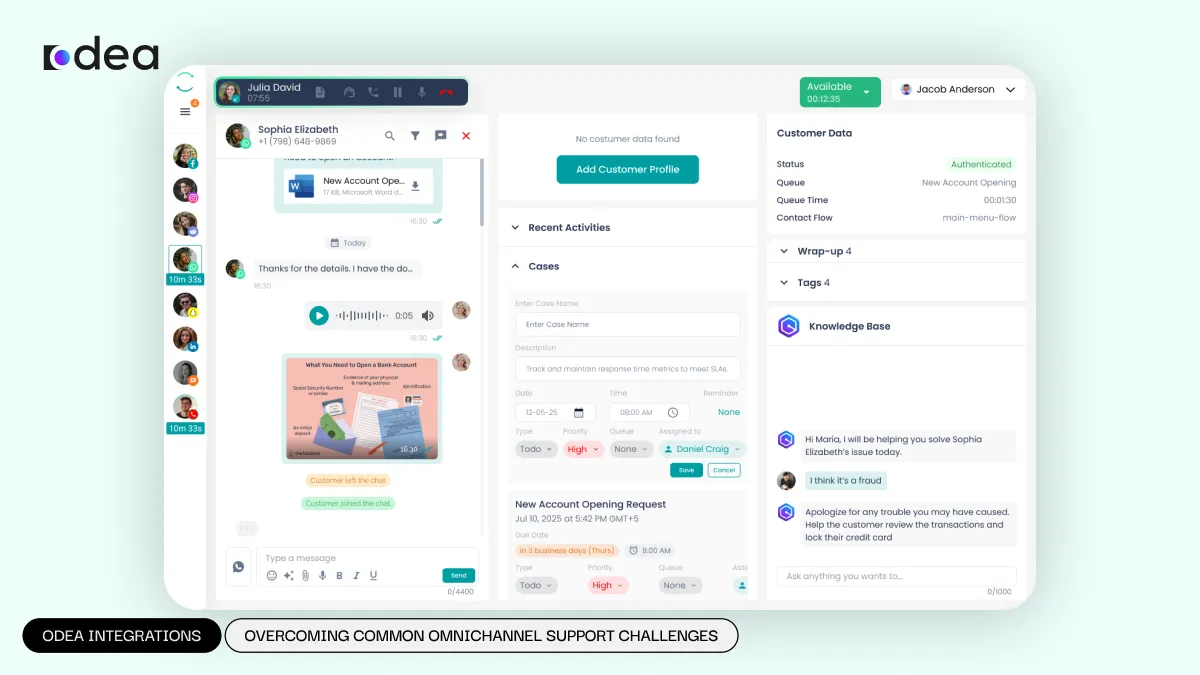One of the toughest challenges businesses face today is getting omnichannel support right—delivering a smooth, consistent experience across all customer touchpoints. These days, customers want quick, effortless, and personalized responses—whether it’s through chat, email, social media, or phone.
For companies using advanced CX platforms integrated by Odea Integration, recognizing and tackling these challenges is key to staying competitive.
Omnichannel support isn’t just about being on multiple channels. It’s about connecting every interaction into one continuous, natural conversation—no matter how your customers choose to engage.
This seamless experience builds trust and loyalty, but getting it right isn’t simple. Many companies still struggle with technology gaps, disconnected data, or inconsistent communication that leaves customers frustrated.
In this article, we’ll dive into what omnichannel support really means, why it’s so important for your business success, and practical ways to overcome common hurdles. Our goal? Helping you build stronger customer relationships and boost your overall CX strategy.
What is Omnichannel Support?
Omnichannel support means delivering smooth, connected interactions across all communication channels. Multichannel, by comparison, means offering customers different ways to reach out—but these channels usually don’t “talk” to each other.
Omnichannel links these channels together, so your customers can switch between platforms—say, from social media to live chat or phone—without repeating themselves.
Omnichannel vs. Multichannel Support
The key difference? Multichannel lets customers choose their preferred platform, but each channel often operates independently. Omnichannel ensures these channels communicate, making the customer journey feel natural and friction-free. This connected experience helps reduce frustration and increases satisfaction.

The Omnichannel Customer Journey Strategy
A well-planned omnichannel strategy maps every step your customers take, making sure the information, tone, and service quality remain consistent—no matter where they reach out. This saves time, reduces friction, and boosts satisfaction. For companies using advanced CX platforms like those from Odea Integration, this strategy is essential to delivering real value and creating lasting loyalty.
Explore this detailed article by Odea Integration. It offers valuable insights on crafting connected experiences that keep customers engaged across all channels.

Why Omnichannel Support Matters
Omnichannel support plays a crucial role in creating a seamless, connected customer experience. Businesses that embrace this approach often see improvements in satisfaction and loyalty. Customers expect effortless, consistent interactions—any mix-ups or repeated questions quickly lead to frustration.
What can you gain from a strong omnichannel approach?
- Consistent Experience: Your customers want their history and preferences to follow them across channels—no restarts or conflicting info.
- Increased Efficiency: Agents see the full interaction history, helping them resolve issues faster and more accurately.
- Higher Engagement: Offering flexible options like chat, email, phone, or social media lets customers connect how they want.
- Better Insights: Combining data from every touchpoint gives you a clearer picture of customer behavior to tailor future interactions.
Companies using cloud CX platforms integrated by Odea Integration unlock these benefits easily. Odea’s solutions help you build smooth, personalized journeys that stand out and create lasting positive impressions.
For a deeper dive into how seamless omnichannel experiences are built and why they matter, check out this detailed guide by Odea Integration,Building a Seamless Omnichannel Contact Center Experience.
Use Cases and Industry Applications
Omnichannel support is transforming customer connections in industries like retail, healthcare, finance, and telecom:
- Retail: Customers enjoy quick access to product info via chat, personalized recommendations on social media, and seamless mobile purchases.
- Healthcare: Patients can book appointments online, get reminders via SMS or email, and consult doctors through video or chat—all while keeping data consistent and secure.
- Financial Services: Customers reach out via mobile apps, social media, or call centers, while agents have access to full interaction histories—ensuring smooth, secure service.
Partnering with Odea Integration means gaining the tech and expertise to deliver this top-notch, connected support that customers expect.
Key Components and Tools for Omnichannel Support
Creating a powerful omnichannel system means more than just adding channels. You need the right tech, strategy, and skilled people working in harmony:
- Unified Customer Data Platform: A centralized hub shares customer info across all touchpoints—so agents always have full context.
- Intelligent Routing and Automation: Smartly directs inquiries to the right agents or bots, speeding up responses.
- Analytics and Reporting: Insights into customer interactions help teams continually improve service.
- Cloud-Based CX Platforms: Flexible, scalable, and easy to update—platforms like those from Odea Integration adapt quickly to changing needs. For an in-depth look at top omnichannel software solutions for contact centers, you can explore this comprehensive guide by Odea Integration.
Together, these tools create a proactive, efficient, and personalized support ecosystem. Odea’s CX solutions combine all these into one agile cloud platform, built around what your team and customers really need.
Common Challenges or Misconceptions
Omnichannel support sounds great—but making it work isn’t easy. Some hurdles include:
- Channel Silos: Different teams managing their own channels separately cause fragmented customer experiences.
- Lack of Real-Time Data Sharing: Without instant updates, customers repeat info, leading to frustration.
- Integration Issues: Older legacy systems often don’t connect well, creating technical roadblocks.
- Over-reliance on Automation: Bots can be helpful but too much automation can feel cold and impersonal.
Many think omnichannel just means more channels. The real challenge is unifying them so the customer journey feels like one smooth conversation—not a patchwork of disconnected interactions.
Companies working with Odea Integration benefit from solutions that break down these barriers, building truly integrated CX platforms that solve these common pitfalls.
How Odea Helps Overcome Omnichannel Support Challenges
Odea Integration tackles these challenges head-on by implementing cloud-based CX platforms that unify all your communication channels into one connected system. This means no more separate channels—just a smooth, seamless ecosystem.
Odea prioritizes real-time data sharing so your agents always have the full customer context. This cuts down repeated questions and speeds up resolution. Plus, Odea simplifies complex integrations to eliminate typical technical headaches.
What makes Odea stand out? They boost agent efficiency while ensuring the whole customer journey feels natural and connected. Whether you’re starting from scratch or enhancing your existing setup, Odea’s tailored approach helps unlock your customer experience’s full potential—without unnecessary complexity.
With Odea Integration, your business can deliver faster, smarter, and more personalized support that builds lasting loyalty and drives growth.

Conclusion
There’s no doubt that omnichannel support comes with challenges—but the good news? They’re all solvable. By focusing on seamless integration, real-time communication, and putting your customer at the center, you can create exceptional experiences that build loyalty and fuel growth.
Every interaction should feel like a natural continuation, no matter where your customer starts or ends their journey.
Thinking it’s time to level up your customer support? Let’s make it happen—reach out to Odea Integration or grab our in-depth guide to get started on your journey toward a more connected, customer-focused future.